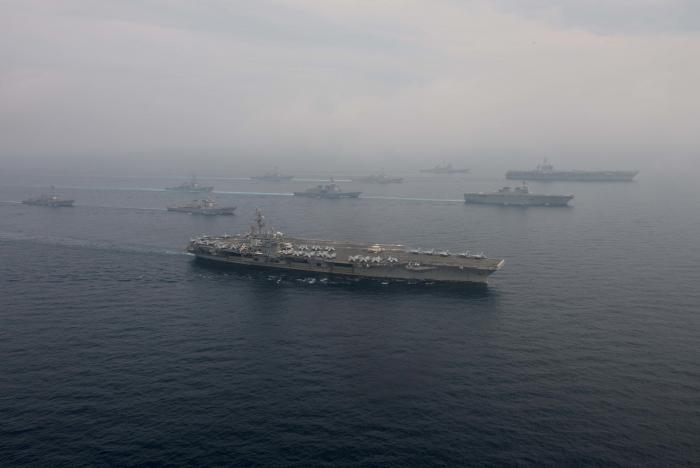TOKYO – A pair of US aircraft carriers and Japanese naval vessels conducted a joint drill in waters off the Korean peninsula Thursday, in an apparent show of force days after the latest North Korean ballistic missile test.
The strike groups of USS Carl Vinson and USS Ronald Reagan joined Japanese destroyers Hyuga and Ashigara for the exercise in the Sea of Japan (East Sea), where Monday’s missile landed.
The drills came as Washington and Tokyo step up their rhetoric with an eye to stopping North Korea’s missile and nuclear programmes.
Pyongyang has now conducted a dozen ballistic missile tests this year, in defiance of UN sanctions warnings and amid fears that it may be preparing for another nuclear test.
The US-Japan drill comes shortly after the Pentagon successfully tested on Tuesday an interceptor system to strike down a dummy ballistic missile.
Last month, naval exercises were conducted in the same waters with the USS Carl Vinson and South Korean and Japanese aircraft taking part. Washington described Thursday’s drill as “routine training”.
“The Ronald Reagan and Carl Vinson Strike Groups were joined by the Japan Maritime Self-Defense Forces (JMSDF) for routine training to improve interoperability and readiness in the Indo-Asia Pacific,” the US Seventh Fleet said on its Facebook page. Japanese military officials declined to comment on the drill.
The United States has led the efforts to bring further sanctions to punish the North and is urging China, Pyongyang’s main sponsor, to play a greater role in applying pressure on the unpredictable regime of Kim Jong-un.
US President Donald Trump has said Monday’s missile test showed “disrespect” for China, while Japan’s prime minister Shinzo Abe vowed that the “North Korean problem is the international community’s top priority”.
Along with South Korea, Japan is the most directly threatened by Pyongyang’s provocations – Monday’s test was the second time this year that a North Korean missile has fallen close to its shores
